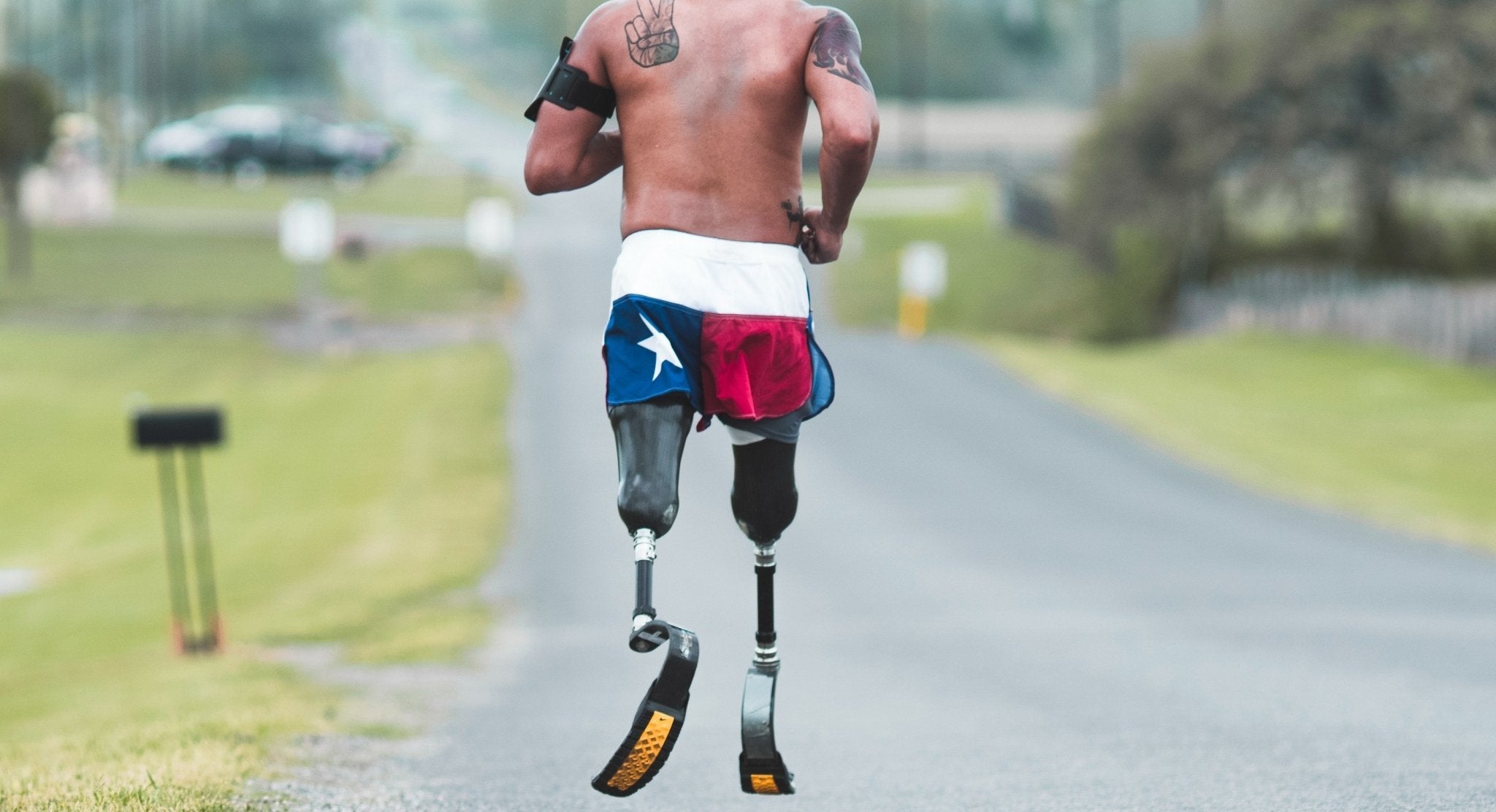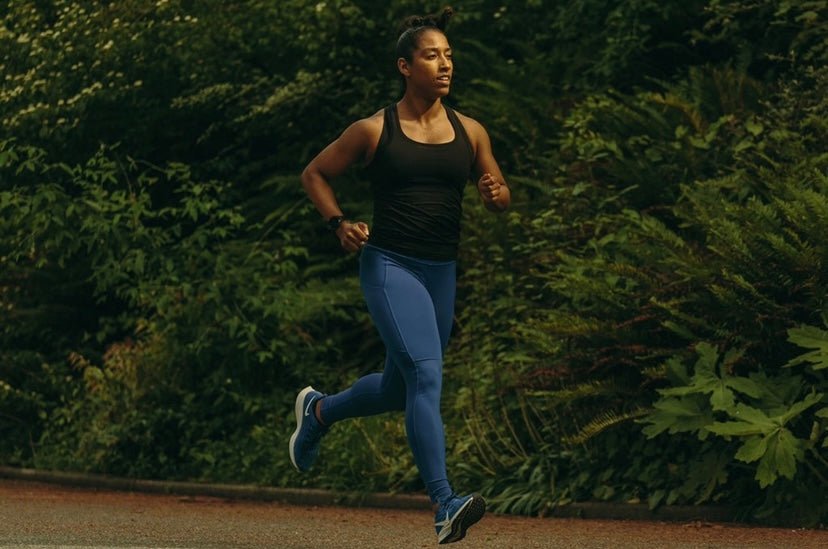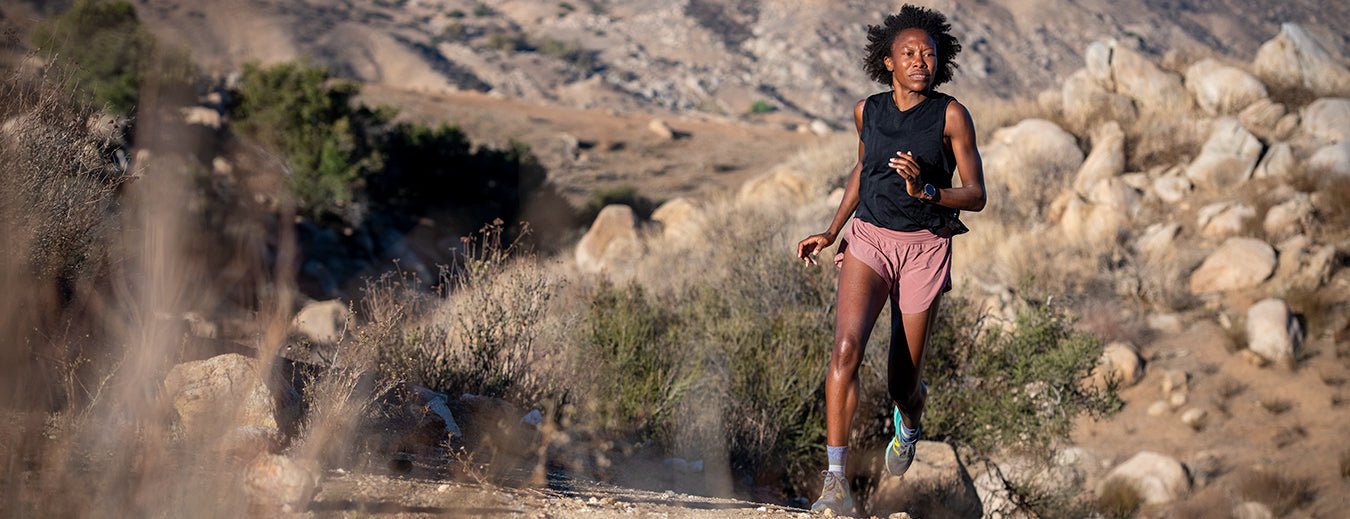Iman Wilkerson gives us "The Run Down" on how she discovered the power of community running - and how her new app will make it even easier for others to connect with the growing running community.

"It sucked."
"I hated it."
"It was an uncomfortable experience."
We all know that the term 'False Start' usually refers to track athletes jumping the gun. However runners of all abilities and all walks of life experience false starts at the beginning of their running journey.
Maybe they weren't in the right mindset. Maybe they went too hard, too soon. Maybe we should simply recognize that getting into running for the first time is tough!
Whatever the reason - Iman Wilkerson won't be alone in finding running to be an "uncomfortable experience" when she first tried it in college and in subsequent years.
But fast-forward to today and the Iman who sits down to join us is a 7-time marathon runner, Lululemon brand ambassador, and the founder of The Run Down - a web-based app that serves as a resource hub for runners in San Diego and LA to find communities, races, places to run and local businesses that support their lifestyle.
The catalyst for this transformation? Community Running.
Not only did Iman fall in love with running, she credits community running with giving her the belief and the confidence to apply herself in ways she never had done before.
We spoke to Iman to discover how running culture and it's communities inspired her to create The Run Down and, at the same time, gave her the mental attributes to do so.
"The cross country kids were the white kids - nobody asked me to do it"

"I was born in Pleasant Garden, North Carolina," says Iman. "You can probably tell from my accent!".
"I have an older and younger brother, so I'm the middle child. But because I'm a girl I think there's a different dynamic, I never had ‘middle child syndrome'."
Razor-sharp and evidently self-confident, we can't imagine that Iman's personality would allow for middle-child syndrome anyway. However, she's quick to recognize how the support of her parents helped shape who she is today.
"My father is from Tennessee and he was a pilot by trade. Not many black pilots came out of there at the time," she explains. "He faced a lot of negativity and a lot of doubt - the way that he’s supported me is probably because of his experience."
Iman believes that her father could have been an excellent distance runner, while her mom was also incredibly athletic. She certainly has the genes for distance running, but despite having an active lifestyle, she never ran for sport when growing up.
"Where I grew up, you neighbors were not a stone's throw away, you had to run half a mile down the driveway to get to them! But running was not an 'activity' that I would do. I'd have had no interest in running a mile if somebody asked me to."

Iman did eventually take up track when she went to high school, which she didn’t hate ("track is where the cute guys are and you got to leave school early"). However, reflecting on that time today, she regrets that her coach simply put her on track when she was much more suited to cross country.
"I think it's called 'confirmation bias'," Iman muses. "You overlook the obvious and just go for the standard you're used to. The cross country kids were the white kids. Nobody asked me to do it, and I never saw anyone who looked like me doing it."
"You can choose to run a marathon and talk about that fact quite casually? That was inspirational to me."
After high school, Iman describes her early 20s as "not a straight line". Having spent her freshman year at a private school, in her sophomore year Iman transferred to the Fashion Institute of Technology in New York City. Shortly after that, she dropped out to start an image consulting business.
Then, after the global financial crisis in 2008, Iman went back to college where she graduated and began working in Production and Product Development.
How did running fit into her life? For the most part, it didn't.
"[My first college] was a small Private school," Iman explains. "Half of the population went off to the Sidney olympics! They were serious athletes and I was not going to try to compete with them on the track."
"I had a boyfriend at the time who would run 3 miles 'just because'," she continues. "He invited me to come for a run one morning with the promise of breakfast - and I hated it. It was an uncomfortable experience."
Despite this negative experience, Iman's next actions already show us a glimpse of her determined personality.
"I decided I could do better," she recalls. "I went out on my own, back to the lake, and continued to run there until I could run three miles by myself."

Iman doggedly overcame her initial dislike of running, but 8 years passed before she properly took it up again, when a peer at a networking meet invited Iman to run a Summertime Series cross country event. Even then, that experience began with another false start.
"It sucked!", laughs Iman. "It was hilly, I was stopping all the time, kids were just running by."
"But I still thought to myself, I can do better next time", she continues. "So I looked up running clubs in my area. I found one where people ran but, most importantly, all went out for beer afterwards!"
"Running with the group, I was suddenly surrounded by people who were running long distance races that I previously thought were for professional runners only. I thought to myself, this is what running can look like? You can just choose to run a marathon… and talk about that fact quite casually?"
"That was inspirational to me. I thought: if I can run with you, and you're not running any faster than I am, surely I can run those long distances too?".
"I felt able to pursue the things I wanted… I felt that I belonged"
Over the next three years, Iman continued to run with groups in New York. In that time, she achieved remarkable things out on the tarmac - but running also started to change her as a person.
"The first group I joined were called "Urban Runners", Iman recalls. "This very social woman named Caroline was like ‘Hey, NYC, meet up at my apartment and drop your bags off here'."
"It was very 'New York'. She didn't even know the people that turned up - they could have been crazy!"
"Then I met two guys, my best buddies, Todd and Kurt," Iman explains. "Todd found this other run club who were really cool. They did these team points races, and he thought I could score for the team."
"I wasn't interested in being competitive, but he encouraged me to come out for this track workout. Afterwards we went to a dive bar… and it turns out the track workout was nothing more than the pregame to the bar!"

The community that Iman had found was none other than North Brooklyn Runners. Running with them through the streets of Brooklyn, Iman enjoyed the support, encouragement and positive peer pressure that all crews like theirs give their members. Before long, she was ready to take on one of the toughest challenges in running - although, once again, it wasn’t an entirely positive start!
"I ran my first marathon, the NYC marathon, in 2010. Again, that sucked," says Iman. "But at the same time, I thought that I knew how I could do better next time."
"And after that first marathon it clicked why people try to BQ [Boston Qualify]," she continues. "Previously I didn't even know what that meant - what is this 'Boston Marathon' that everyone is always speaking about?"
"But after the NYC Marathon I started asking: 'So what time do you need in order to BQ? Oh, I think I can do that'. Then, in my second Marathon, I BQ'd."
"That was the point when I realized that, if I applied myself, I could do it," Iman explains. "In my twenties I used to think I was average, I never really applied myself. I was always looking for external validation."
"But when I chose running, that relied on me, my own confidence, and my own belief. Things started to correlate with my life - I felt able to pursue the things I wanted, I felt that I belonged in places, things like that."
"I struggled to find a community to fall into. It was one of the worst training periods for me"

Iman spent three years running with North Brooklyn Runners, before moving to Chicago to live with her then boyfriend. Being away from New York, and specifically North Brooklyn Runners, the value of community running crews became even more clear to her.
"When I removed myself from [the running community], I realized how much of what I achieved was driven by the people around me," Iman explains. "In Chicago, I struggled to find a community to fall into. It was one of the worst training periods for me."
"North Brooklyn Runners was so authentic, organic, so free - it started with one person putting up flyers in Williamsburg!", she continues. "That group of people were the ones who truly made me understand the word 'community'. Every single day people volunteered their time for other people - they showed up."
Today, from her current home in San Diego, Iman has been inspired to capture everything that’s special about community running culture in app form.
"I don't see myself as trying to create something," she explains. "I'm trying to cultivate something - by making connections between those incredible communities and the people who might benefit from them."
"That's what I do - I see problems, I see opportunities, and I make connections."
"My mission is to make running accessible and affordable to everyone."

What Iman has cultivated is The Run Down - an app where people can get the run-down of all things running-related in San Diego and LA. As somebody who has struggled to get into running previously, and found it hard to find other groups like North Brooklyn Runners, Iman has channeled both her own experiences and the ethos of community running into the app.
"When you're first getting into running, how do you find information to know where to go?," Iman asks.
"Running is supposed to be the easiest activity, just put on your shoes and go, but when you're out the door… where do you go? What routes do you follow? Where are the good trails? Where are the running groups? All that information is scattered - and it’s very word-of-mouth."
The content within the app is crowdsourced from local runners, influencers and run leaders. It’s information that runners can trust, direct from the very running communities who are creating experiences for runners in San Diego and LA.
"You can find recommended places to run in and explore - and you can find a calendar of events where you can see run clubs running every day," Iman explains.
"You can also find local businesses that support your running lifestyle. That could be a coffee shop, running coach, physical therapist, running store, or even a brewery!"
"My mission is to make running accessible and affordable to everyone," says Iman. "So if I can do things like pass along discounts, advertise free races, giveaway gear from Lululemon, let me do that. People deserve to run and they deserve to run in good apparel."
"That's what I love about runners - they see a challenge and say 'I think I can do it'"

In developing the app, Iman has had to embrace and overcome the numerous challenges that entrepreneurs face. Not least, earning money (she spent around 18 months driving with Lyft for income while developing the app). It can be a tough, lonely journey - but running has helped to equip Iman with the belief and confidence required to succeed.
"I don't have a background in tech," she explains, "but I think sometimes it's fine to not have expertise in something. It means you can bypass tradition. That fresh perspective can even make seasoned industry types start to think outside the box."
"Actually that’s what I love about runners," she continues. "They see a challenge and say 'I think I can do it!' - if not today, in a few weeks. Of course it's a physical challenge fundamentally, but it's also a mental challenge that they're overcoming. There’s a lot of mental effort required in finding determination and perseverance."
Certainly Iman has demonstrated no shortage of determination and perseverance to achieve what she has to-date - and we're curious as to what comes next for The Run Down.
"We are working with Lululemon again to put on an initiative called 'Run the Coast'," Iman explains.
"Last year we connected with 6 cities in California and we challenged runners to get out there, collect miles and collect trash. Together they collected over 900lbs of trash over the course of the week! This year we are going further up the coast to Portland and Seattle."
"I want The Run Down to continue to create impactful experiences like that. Affordable, accessible, or experiences that simply help make our cities a better place."
We've heard countless running stories, from cities across America, that demonstrate the incredible things that happen when special individuals (like Iman) and special groups (like North Brooklyn Runners) connect with one another. So often, life-changing events are born from a chance encounter or introduction.
By facilitating more and more of those connections, The Run Down app has the potential to accelerate the growth of urban and community running culture like never before. It’s impact - for individuals and communities alike - could be profound.

Read more

How a self-confessed outcast and double leg amputee, from a small town outside of Houston, went on to become a pillar of the city’s active community.

The co-founder of Club Seattle Runners Division describes her own difficulties navigating certain spaces - and why it inspired her to start creating her own.

